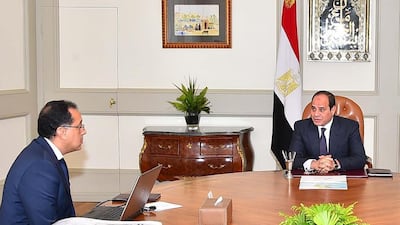Egyptian president Abdel Fattah El Sisi ordered a massive shake-up of the defence establishment after last month's confrontation between Islamist militants and security forces in the Western Desert just 135 kilometres from Cairo, signalling a re-assessment by top authorities in their approach to terror organisations.
In late October, Mr El Sisi named a new army chief of staff and interior minister Magdy Abdel-Ghaffar ordered a leadership change at the National Security Agency - the main internal intelligence directorate.
But following Friday’s massacre at the Al Rawda mosque in North Sinai - the deadliest terrorist attack in Egypt’s modern history, authorities are signalling more of a doubling down of their approach to security challenges in the region than a policy rethink.
“This attack will do nothing but make us stronger and more persistent in our effort combat terrorism, Mr El Sisi told a nation stunned by the unprecedented assault on Muslim worshippers that has yet to be claimed by any group.
And a press briefing on Friday night by Dia Rashwan, who heads the state information service, underscored the key themes that the administration has emphasised since Mr El Sisi’s ascension to power.
Those themes include the assertion that all terrorism in the country is ultimately rooted in the ideology and structure of the Muslim Brotherhood – outlawed in Egypt since 2013 - and an insistence that all violence is directed at the destruction of the Egyptian state, not a replacement of the country’s military-influenced political leadership.
“The battle has become so clear in the decisive stage,” Mr Rashwan said. “All Egyptians are lining up in the face of a paid rogue group sponsored by the enemies of Egypt and humanity abroad.”
The administration categorically rejects suggestions that the terror groups linked to Al Qaeda and ISIL have made gains in recruitment or created a support base due to any shortcomings in Egypt’s domestic political arrangements or economic challenges.
Cairo continues to hold outside forces responsible for the ideological and financial energy behind domestic terrorism, which claimed the lives of 293 citizens in 2016 and at least 305 in Friday’s attack alone.
“The world's reluctance to uproot its [terrorism’s] support and finance will lead to spreading its evil everywhere in the world,” said Mr Rashwan. “Egypt’s people and leadership will continue to confront it courageously and defend her citizens on behalf of humanity.”
Global and regional media outlets are also blamed for a misunderstanding of the scale of Egypt’s terror challenge, which officials insist is still largely confined to a limited area in north-eastern Sinai comprising just 30 square kilometres out of Egypt's total area of one million sq km.
“There is no excuse for those determined to use ambiguous terms such as the so-called “armed opposition”, “political violence”, “conflict with the regime” or “confrontation with gunmen” and those who use this language are partners to the terrorists, either by encouragement or evasion,” Mr Rashwan said.
Authorities are also making it clear that there will be no change of policy regarding imprisonment of the government’s political opponents, or a loosening of regulations on personal expression.
“This heinous crime is an alarm to all organisations that trade in raising high the banners of “human rights and freedoms”, the state information service declared.
Pro-administration Egyptians take it as an article of faith that a disciplined military leadership in the global Muslim Brotherhood continues to menace stability in Egypt with a combination of soft and hard power, coupled with strong fund-raising capabilities.
"The Brotherhood mobilises support for terrorism, justifies it and censures those who attempt to fight it," said Abdel Moneim Said, chairman of the Regional Centre for Strategic Studies in Cairo. " When terrorists are killed they become 'martyrs' who merit prayers and glorification. The actions of their affiliates Hasm, Anjad Masr, Allqab Al Thawri show they they do not hesitate to practise violence as we see in Egypt today."
The official mourning period for mosque massacre will continue until Monday – but the sense in Cairo is that the government intends to hold a fortress around its controlling principles for a very, very long time.
____________________
Read more:
Editorial: Worst terrorist atrocity in Egypt's modern history calls for a tough response
Murderous attack in Sinai a shift in tactics for ISIL: analysts
We thought the terrorists were after Egypt's Christians. Turns out, they are after everyone
____________________

